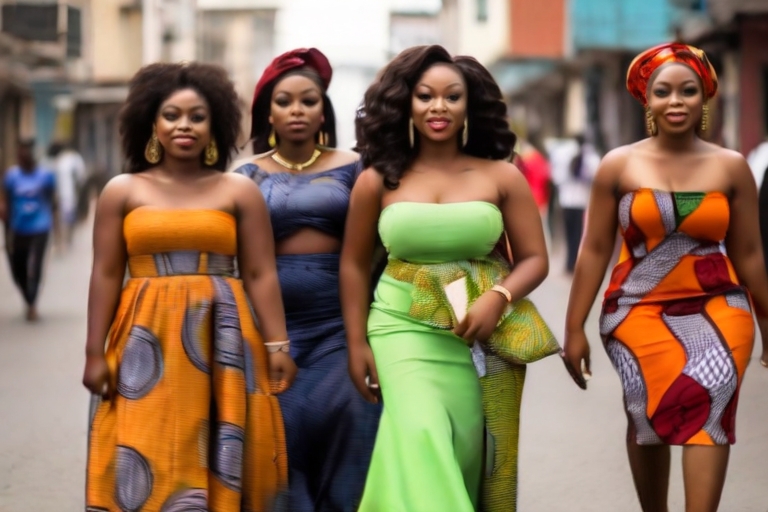shoprenomos

A Deep Dive into Nigerian Fashion

Nigeria, often hailed as the giant of Africa, boasts not only a rich cultural heritage but also a vibrant and diverse fashion scene. From traditional attire steeped in centuries-old customs to modern interpretations influenced by global trends, Nigerian fashion reflects the nation’s dynamism, creativity, and resilience. In this blog post, we’ll embark on a journey through the multifaceted world of Nigerian fashion, exploring its various types, influences, and significance.
Traditional Nigerian Attire
Traditional Nigerian attire serves as a visual tapestry of the country’s diverse ethnic groups, each with its unique style and symbolism. Among the most recognizable traditional outfits is the Yoruba attire, comprising the Buba (blouse), Iro (wrapper), and Gele (headgear) for women, and the Agbada (flowing robe) for men. These garments feature intricate designs and vibrant colors that often signify status, cultural identity, and celebration.
Similarly, the Igbo traditional attire includes the George wrapper for men and the wrapper and blouse ensemble for women, adorned with colorful embroidery and patterns. Igbo attire holds significance during cultural ceremonies, such as weddings and festivals, serving as a symbol of pride and identity for the Igbo people.
In the northern region of Nigeria, Hausa traditional attire is characterized by the flowing Babariga for men and the Buba and wrapper for women. Made from colorful, patterned fabrics such as Ankara or Hollandaise, these garments are embellished with intricate embroidery and jewelry, reflecting the rich cultural heritage of the Hausa people.
Modern Nigerian Fashion
While traditional attire remains an integral part of Nigerian culture, modern Nigerian fashion has evolved to embrace contemporary trends and influences. Nigerian designers have gained international acclaim for their innovative designs, blending traditional aesthetics with modern sensibilities.
Ankara, also known as African wax print fabric, has become synonymous with Nigerian fashion, finding its way into a myriad of contemporary clothing styles. From dresses and skirts to shirts and trousers, Ankara fabric adds a bold and vibrant touch to modern Nigerian attire, showcasing the country’s rich textile heritage.
Furthermore, Nigerian fashion designers are increasingly prioritizing sustainability and ethical practices within the industry. Many designers are turning to eco-friendly materials and production methods, supporting local artisans and communities while promoting environmental stewardship.
Fashion Weeks and Events
Nigeria hosts several prestigious fashion events and shows that celebrate the country’s talent and creativity on a global stage. Lagos Fashion Week, held annually, brings together fashion designers, industry insiders, and enthusiasts from around the world to celebrate African fashion and culture.
Other notable events include Arise Fashion Week and African Fashion International (AFI) Fashion Week, which attract top designers and models from across the continent. These fashion weeks not only provide a platform for Nigerian designers to showcase their work but also contribute to the growth and recognition of African fashion globally.
The Rise of Nigerian Street Style
In addition to traditional attire and high fashion, Nigerian street style has emerged as a vibrant expression of youth culture. Influenced by music, art, and social media, Nigerian street style is characterized by its eclectic mix of bold colors, patterns, and accessories.
From the bustling streets of Lagos to the vibrant markets of Abuja, Nigerian youth are redefining fashion norms and embracing individuality through their clothing choices. Streetwear brands such as Wafflesncream and Vivendii are gaining popularity for their urban-inspired designs and edgy aesthetics, catering to a new generation of fashion-conscious Nigerians.
Social media platforms like Instagram and Twitter have played a pivotal role in amplifying Nigerian street style, providing a platform for fashion enthusiasts to share their looks and connect with like-minded individuals. Hashtags such as #NaijaStreetStyle and #AfricanFashion have become virtual hubs for showcasing the diversity and creativity of Nigerian fashion.
Challenges and Opportunities
Despite its growth and popularity, the Nigerian fashion industry faces challenges such as inadequate infrastructure, intellectual property theft, and limited access to finance and resources. Additionally, the COVID-19 pandemic has had a significant impact on the fashion sector, disrupting supply chains and consumer behavior.
However, amidst these challenges lie opportunities for growth and innovation. Nigerian fashion entrepreneurs are leveraging technology and e-commerce platforms to reach a wider audience and expand their businesses globally. Government initiatives aimed at supporting small and medium-sized enterprises (SMEs) are also providing much-needed assistance to aspiring designers and fashion startups, fostering a conducive environment for growth and development.
In conclusion, Nigerian fashion is a vibrant tapestry woven from a blend of tradition, creativity, and innovation. From traditional attire to modern interpretations, Nigeria’s fashion landscape reflects the country’s rich cultural heritage and dynamic spirit. As the industry continues to evolve, Nigerian designers are poised to make an even greater impact on the global fashion stage, showcasing the beauty and diversity of African fashion to the world.